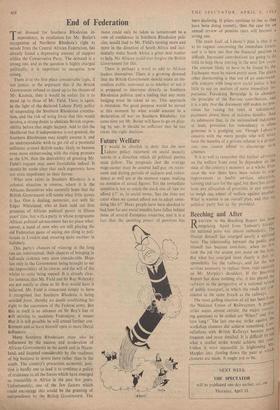End of Federation
THE demand for Southern Rhodesian in- dependence, in retaliation for Mr. Butler's recognition of Northern Rhodesia's right to secede from the Central African Federation, has already found a depressing amount of support within the Conservative Party. The demand is a strong one, and as the question is highly charged politically, it is important to recognise how strong.
There is in the first place considerable logic, if not justice, in the argument that if the British Government refused to stand up to the threats of Mr. Kaunda, then it would be unfair for it to stand up to those of Mr. Field. There is again, in the light of the declared Labour Party policy of suspending the Southern Rhodesian constitu- tion, and the risk of using force that this would involve, a strong desire to abdicate British respon- sibility before that might happen. Add to this the , likelihood that if independence is not granted, the Southern Rhodesians may simply assume it, and an understandable wish to get rid of a perennial millstone around British necks, likely to become even more embarrassing with the rising pressure at the UN, then the desirability of granting Mr. Field's request may seem formidable indeed. It should be made clear that such arguments have not even expediency in their favour.
What now exists in Southern Rhodesia is a colonial situation in reverse, where it is the Africans themselves who earnestly hope that the British Government will retain what little power it has. One is dealing, moreover, not with Sir Edgar Whitehead, who at least held out firm promises of African political power in fifteen years' time, but with a party in whose programme African political advancement has no place what- soever, a band of men who are still playing the old Federation game of saying one thing to poli- ticians in London and meaning quite another in Salisbury.
This party's chances of winning in the long run are infinitesimal; their chances of bringing in full-scale violence very soon considerable. Hope lies only in the Government being brought to see the impossibility of its course, and the will of the whites to resist being sapped. It is already clear, for instance, that Mr. Field and Sir Roy Welensky are not nearly as close as Sir Roy would have it believed. Mr. Field is concerned simply to have it recognised that Southern Rhodesia is being seceded fr9en, thereby no doubt establishing his right to the succession of the Federal army. But this in itself is an advance on Sir Roy's line of still striving to maintain Federation; it means that it is still possible he will attend further con- ferences and so leave himself open to more liberal influences.
Many Southern Rhodesians must also be influenced by the success and moderation of African Governments in the north and in Nyasa- land, and daunted considerably by the readiness of big business to invest there rather than in the south. The country's precarious economic posi- tion is hardly one to lead it to continue a policy of resistance to all the forces which have emerged so irresistibly in Africa in the past few years. Unfortunately, one of the few factors which :ould encourage this would be the granting of ndcpendence by , the British Government. The move could only be taken as tantamount to a vote of confidence in Southern Rhodesian poli- cies, would lead to Mr. Field's turning more and more in the direction of South Africa and inci- dentally make South Africa a great deal readier to help. No African could ever forgive the British Government for this.
There is perhaps a word to add to African leaders themselves. There is a growing demand that the British Government should make an im- mediate public statement as to whether or not it is prepared to intervene directly in Southern Rhodesian politics, and a feeling that any more hedging must be taken as no. This approach is mistaken. No good purpose would be served at this moment by what would amount to a declaration of war on Southern Rhodesia: for some time yet Mr. Butler will have to go on play- ing by ear. It should be sufficient that he has taken the right decision.


































 Previous page
Previous page